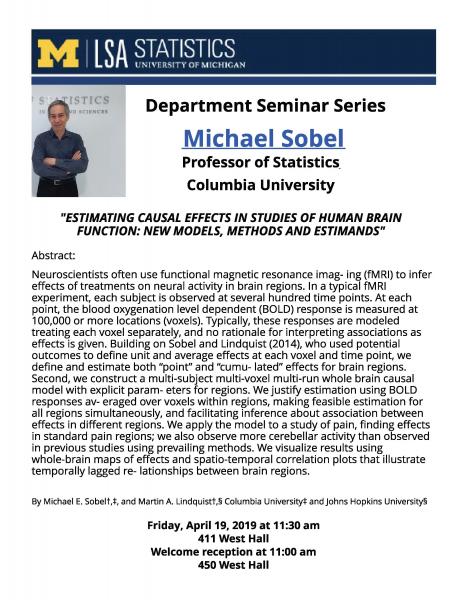Statistics Department Seminar Series: Michael Sobel, Professor, Department of Statistics, Columbia University
"ESTIMATING CAUSAL EFFECTS IN STUDIES OF HUMAN BRAIN FUNCTION: NEW MODELS, METHODS AND ESTIMANDS"
Neuroscientists often use functional magnetic resonance imag- ing (fMRI) to infer effects of treatments on neural activity in brain regions. In a typical fMRI experiment, each subject is observed at several hundred time points. At each point, the blood oxygenation level dependent (BOLD) response is measured at 100,000 or more locations (voxels). Typically, these responses are modeled treating each voxel separately, and no rationale for interpreting associations as effects is given. Building on Sobel and Lindquist (2014), who used potential outcomes to define unit and average effects at each voxel and time point, we define and estimate both “point” and “cumu- lated” effects for brain regions. Second, we construct a multi-subject multi-voxel multi-run whole brain causal model with explicit param- eters for regions. We justify estimation using BOLD responses av- eraged over voxels within regions, making feasible estimation for all regions simultaneously, and facilitating inference about association between effects in different regions. We apply the model to a study of pain, finding effects in standard pain regions; we also observe more cerebellar activity than observed in previous studies using prevailing methods. We visualize results using whole-brain maps of effects and spatio-temporal correlation plots that illustrate temporally lagged re- lationships between brain regions.
By Michael E. Sobel†,‡, and Martin A. Lindquist†,§ Columbia University‡ and Johns Hopkins University§
By Michael E. Sobel†,‡, and Martin A. Lindquist†,§ Columbia University‡ and Johns Hopkins University§
| Building: | West Hall |
|---|---|
| Website: | |
| Event Type: | Workshop / Seminar |
| Tags: | seminar |
| Source: | Happening @ Michigan from Department of Statistics, Department of Statistics Seminar Series |


